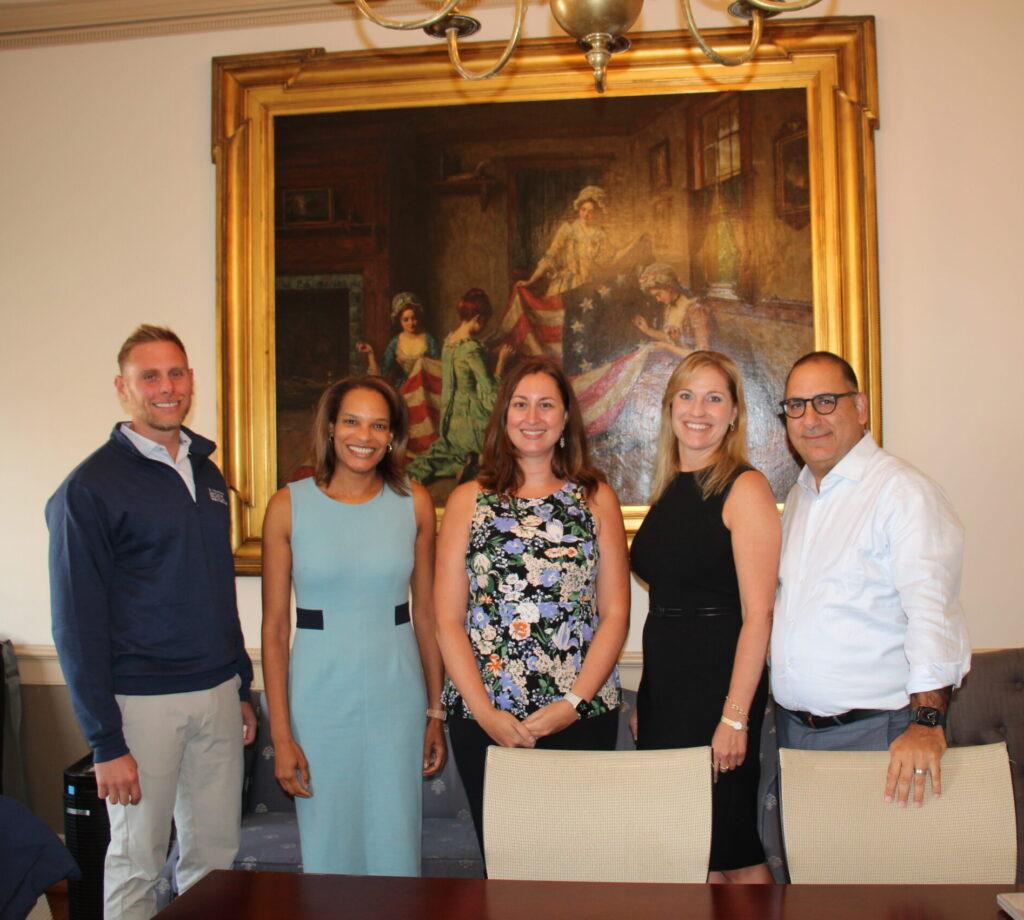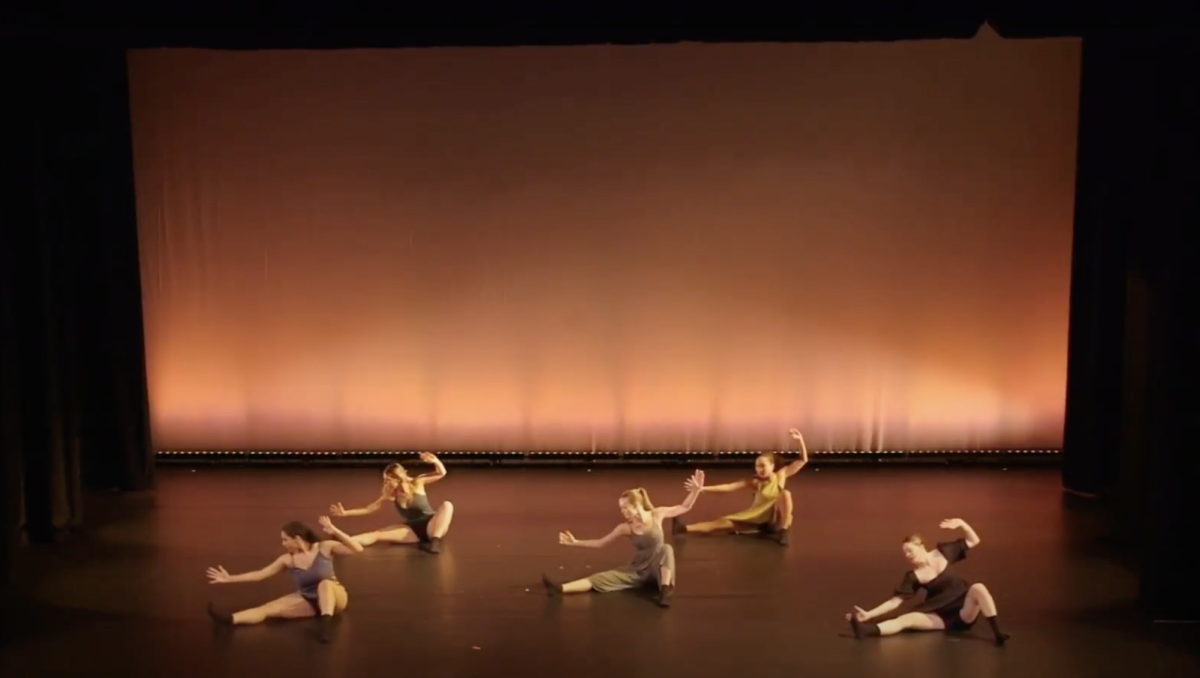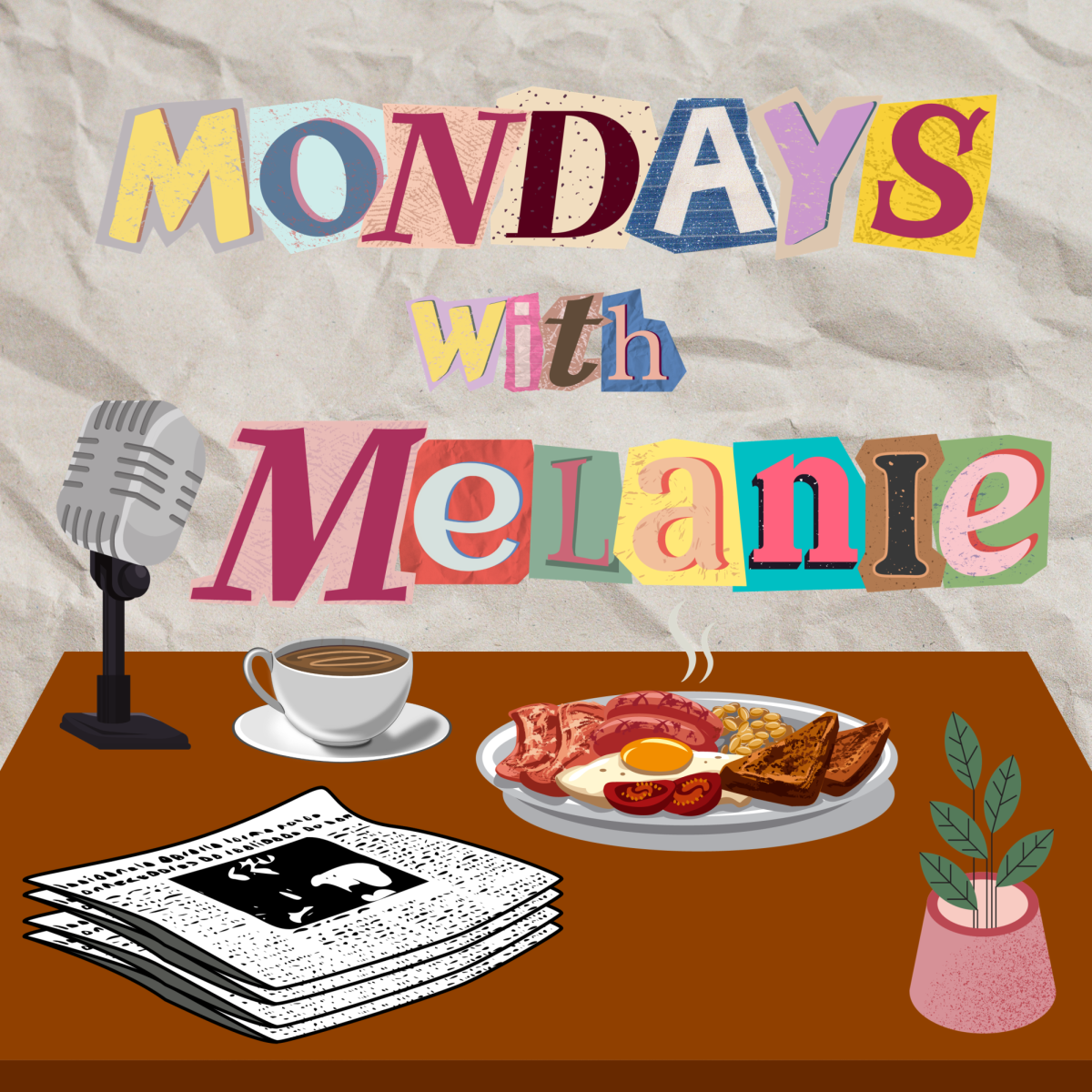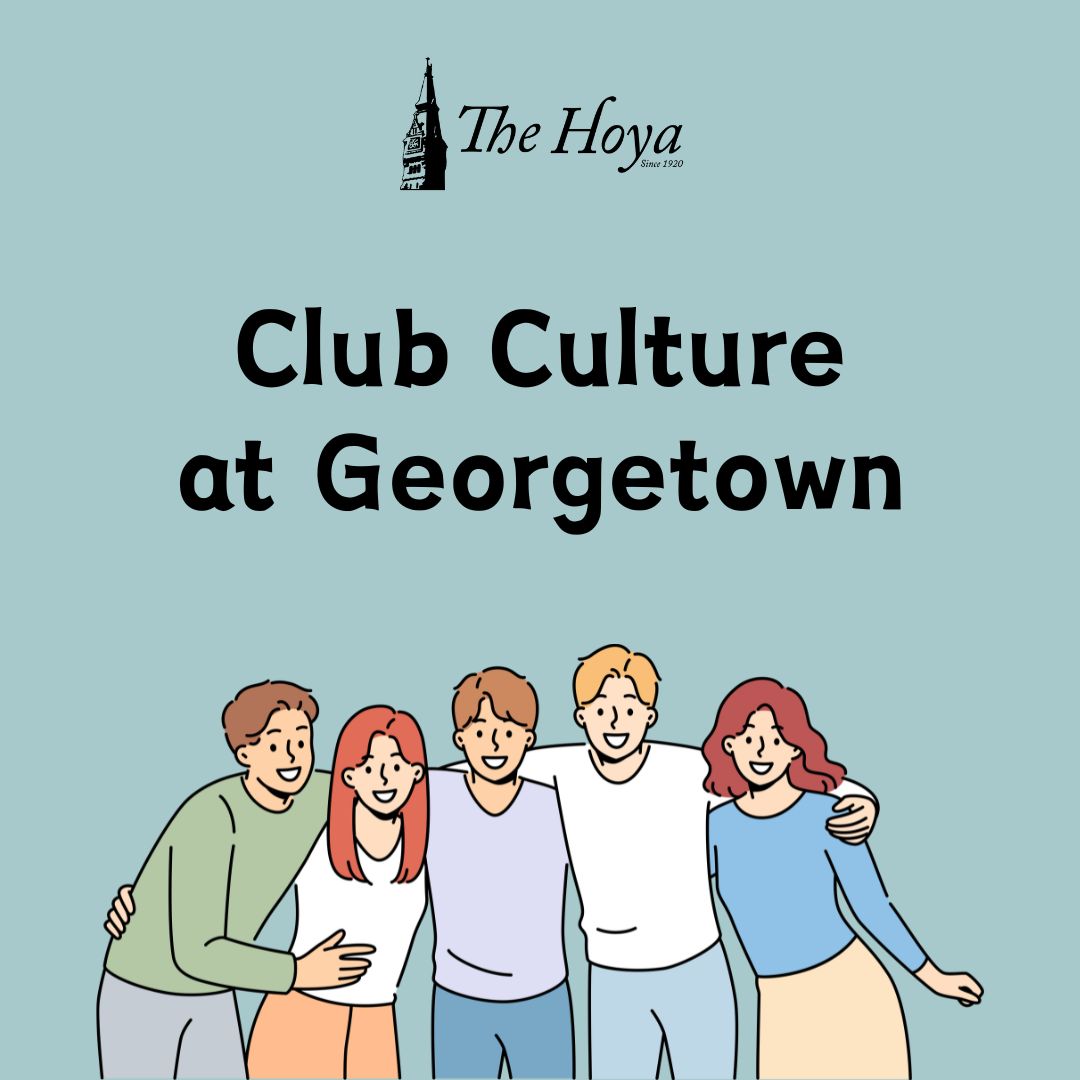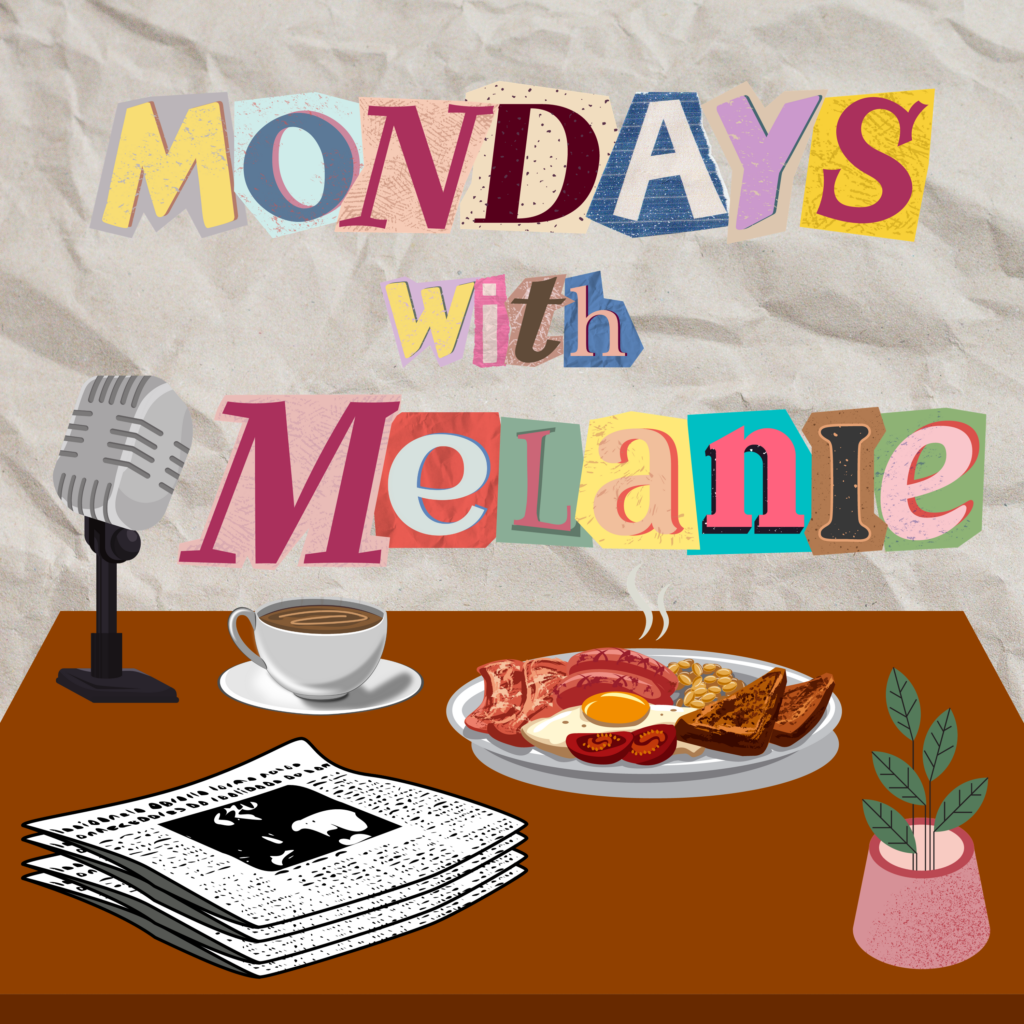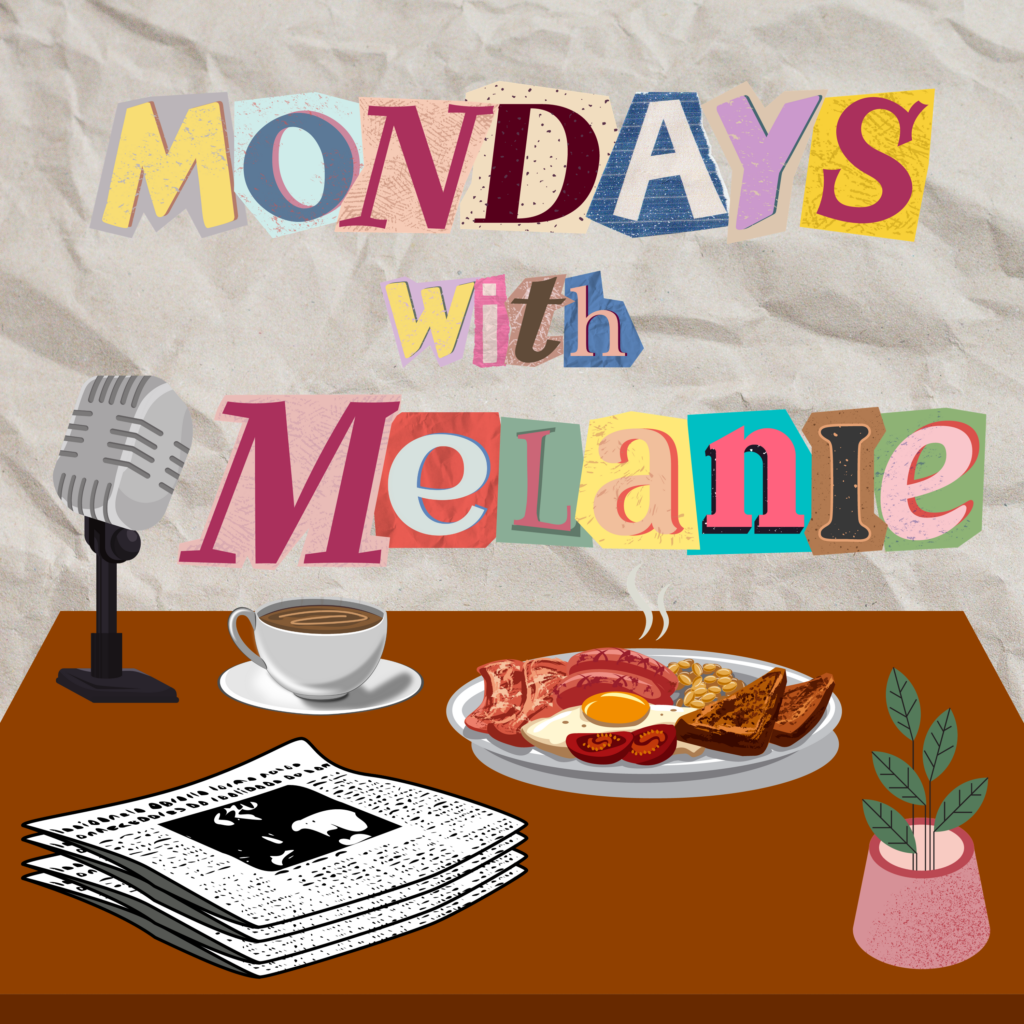Senior News Editor Clayton Kincade interviews the Fall 2023 cohort of GU Politics fellows: Brenda Gianiny, Joe Hack (C ’09), Nia-Malika Henderson, Emily Horne, Craig Minassian and Cristóbal Alex. Each fellow will engage with students through weekly discussion groups and office hours throughout the semester. Listen along as they discuss current events, advice for young people entering politics, their favorite artists and more.
Read the written version of the article here.
Transcript:
Clayton Kincade (CK): Hi everyone. My name is Clayton Kincade, and I’m one of the Fall 2023 Senior News Editors for The Hoya. This week, we had the incredible opportunity to speak to this semester’s GU Politics Fellows. Listen along to an audio recording of our conversation.
CK: I’m going to ask a couple of questions, so since time is limited, I want all of you to answer. So we’ll just go around for each question, and around a minute will be perfect. I have five questions. There are six of you, so five times six 30 – for 30 minutes. And then I’m going to ask one rapid fire question, which will be exciting. So, we will start with you if that’s okay. All right. Perfect. And then same question for everyone, and then just kind of going around. So what is the biggest political issue facing Gen Z today?
Brenda Gianiny (BG): I think polarization. I think just how divided the country is, it makes it so hard to pass any legislation that benefits the country, that you can really have an impact on.
Craig Minassian (CM): It’s about the institutions, rather than about politics in general.
Nia-Malika Henderson (NH): I think it is, what is America? Who’s it supposed to represent? What is it supposed to look like? Is it an inclusive country? Is it expansive? Who is it for? Sort of the issue of diversity and inclusivity and pluralism. I think those are at the core of a lot of division and polarization, which is what this is supposed to look like and who it is supposed to represent.
Joe Hack (JH): I think, as our founder Mo [Elleithee], would say – he’s not here, but – democracy itself is sort of facing stress tests in many regards. And I think the future of democracy is somewhat a question of what that looks like, and the country we grew up in will be the country you all inherit. I think that’s kind of an open question.
Emily Horne (EH): I agree with all of my colleagues and would add that all of this is happening against the backdrop of the existential threat of climate change.
CK: Perfect. So kind of a similar topic, but what are the biggest challenges facing the Republican and Democratic parties this election cycle?
EH: I’m a national security professional, so I do not kid myself that my issues are going to be anywhere on the front of voters’ minds come next November. I would say that the lack of faith in institutions and the mistrust that has been sown about our ability to hold free and fair elections is something that I worry about a lot. And I know that it has very much hurt our standing on the world stage when our both allies and adversaries can no longer count on the United States of America having a peaceful transition of power.
JH: And for Democrats, their big challenge, this election is enthusiasm for President Biden, particularly among the traditional components of their voter base. And for Republicans, the big X Factor, of course, is the former president and how he impacts things.
NH: Totally agree with Joe here that, you know, apathy for Democrats can make that Biden coalition energized and come back together again. And for Republicans, is Trump going to go to jail? Is he going to get convicted? Is something going to happen with him – if he is the eventual nominee.
CM: I agree, enthusiasm and motivation, actually I think for both parties, which has always been typical. An election is giving people a reason to get out there and vote. Slightly different for each party in this case, but both motivating them to want to cast their vote for their nominees is going to be a challenge.
BG: I think both parties have the exact same problem, and it’s their fringes. You see it in the data. We’re seeing fewer and fewer people say “I’m a Republican,” or “I’m a Democrat.” And you have this huge center now; it’s up to over 45% of the public. And I think on the left, you know, you have people pushing towards policies that are so unpopular publicly – the biggest example is like “defund the police” – where you’re losing that soft Democrat. And on the right, we have our Marjorie Taylor-Greenes and even our Donald Trumps that have those soft Republicans just doubting – they know they’re conservatives in their core – but doubting that they have a place in the party.
CK: Alright, so last heavy political question, but how do you feel about deep fakes and AI impacting this year’s elections, specifically with social media?
CM: It’s frightening. I think we just don’t know yet the real impact. And that’s frightening. I think we’re very well prepared from some of the challenges that we’ve had with past elections, and just have no idea how it’s going to impact this one. I would say very frightening, very concerning.
BG: I would echo that completely. I think it’s very scary. We’ve already seen it. We started the ’22 elections – we saw some ads that had an opposing candidate doing a job interview that never happened. I think we already have so much mistrust and misinformation. I think when that gets out, it’s going to make people further question the whole process. To Joe’s point, you know, further kind of take democracy off the rails. So I know there are regulations being set up around it, but they’re not moving fast enough.
NH: Yeah, I agree. I mean, I think the American public, isn’t really trained right yet, to kind of spot AI and spot sort of deep fake video. And often, you just want to believe what you see, because it confirms whatever political belief you have anyway, or idea about an opponent. And so yeah, I think this is going to be a major and frightening trend that we see in this election.
JH: Yeah and then just obviously, not how opposing campaigns would potentially utilize of course, foreign actors, and we’ve seen meddling in previous elections. And you can only imagine the possibilities with these tools at their disposal.
EH: I’ll be a little contrarian and say that for this coming election, I am less worried about the deep fakes themselves because I think a lot of the technology is still in an adolescent phase. And for sophisticated audiences, I think it’s reasonably easy to spot the tells. What I worry about is the discourse around them. Think back to the Nancy Pelosi drunk video, which was in fact, not an AI or manipulated image, it was a deceptively edited video. But the discourse around that product, which was then amplified on TV, on the internet, in political chatter, you know, was extensive. There were so many conversations about that video that it became a subject for people who never even saw the video in and of itself. And we know from behavioral sciences and social sciences and cognitive science, that what their brain remembers is not the fact that it was a fake. It remembers that Nancy Pelosi drunk. And so even the act of debunking disinformation and misinformation, research is increasingly showing that the act of debunking is one, ineffective in and of itself, and two, makes the idea that you’re trying to debunk that much stickier. It introduces something, and it’s now a part of the dialogue and the discourse. So I worry about those second and third order effects for this next election, more than the actual technology itself. Now, the technology is going to continue to get better and better, no question. And we are going to have very, very serious challenges with it down the road. But the short term challenge that I’m more worried about is the broader discourse.
CK: Great. So more fun type questions? What is one piece of advice that you wish you had that you would give to students in their college careers?
EH: I know that no one will listen to this because I would not have listened to it when I was an undergrad. Don’t peak too early. Find time to get the basics right. Learn how to write, learn how to staff, learn how to fail in a safe space, make good mistakes and learn from them. And then when you are ready, really try to chase the big jobs. But this is a small town and people have long memories. And if you get a big job when you are not ready for it, you will make mistakes that will follow you throughout your career. So be ready for the opportunities when they come but don’t push yourself to be ready for something that you’re not ready for just because it sounds impressive.
JH: My number one rule is don’t be a jerk. I think a lot of people think to get ahead in Washington, you need to have sort of “House of Cards” skills. And I have found, and I think this is true with others as well, that being good to people gets you much further. And it is a small town, and people move in and out of different roles at different times, but no one really ever goes away. So it’s important to build good relationships, and at the end of the day, this is a business and a game about people. Doesn’t matter how much processing power or how much information you have, because it’s a people game.
NH: I think have fun, enjoy the ride. Don’t focus too much on what you think success is or achievements are and how stacking your resume and getting all sorts of internships. Because I think ultimately it works out. I mean, I think young people look at people’s careers and think, you know, they kind of go in a straight line. And oftentimes, I think all the time, it’s sort of a windy path. You might be over here and get this job, and maybe you, you get another job. And it’s not just a straight shot to the top. And once you get to the top, it’s important to have family and friends around you, who love you and support you.
CM: I agree with all, that’s all good advice. Be open to ideas, opportunities. Now is the time to do it even if you don’t think it’s directly related to what you may do. And recognize that you actually don’t know wherever your career may take you to. So taking that time to deal with everything, I think is helpful.
BG: Mine’s kind of a contradiction. I’m a Gen X-er, so my first rule is work hard. I would work everyone around you. Get in early, stay late. That’s how you rise through the ranks. But then also to follow up with Nia and with what Craig said — but enjoy the ride. It really, it honestly, it sounds a cliche, but it is more fun climbing than being at the top.
CK: And what has been a highlight moment or memory from your career?
JH: I’ll go. I, in my capacity as a lobbyist actually, worked on the marriage equality bill, and was one of the lead Republican consultants in getting that passed. So that was a lot of blood, sweat and tears personally and professionally. And to get that across the finish line was a big deal for me.
NH: One of the big highlights was being on Washington Week with the late great Gwen Ifill, whom I had watched as a kid growing up, worked at the Baltimore Sun, and worked at The Washington Post, and then finally went to TV. And when I was on set with her in 2012,
‘cause I was covering the [candidate] campaign,, I thought I had completely made it in my career because I was sitting at the table with Gwen Ifill.
CM: I’ll give two answers that are slightly different. When I was fortunate enough to work in the White House, every day walking into the building – just, I just couldn’t believe that that’s what I had the opportunity to do. And then the responsibility came along with actually doing it. I think all of us who have worked in those halls stopped and said, or should take a minute to stop and say, how fortunate we are to serve. And then the other part of my career in entertainment, producing the Jon Stewart and Stephen Colbert around to restore sanity on the National Mall. And that moment when you open the doors and saying you hope it’s going to be a success, and you don’t know, and then to see thousands of people straight again with their really clever, creative homemade signs was just incredibly fulfilling to see, you know, an idea hatched among a couple of comedians really come to life in a way that galvanized people for all these really great reasons.
BG: I think when you lose that feeling — when you walk into the White House and it doesn’t feel special — it’s time to move on, absolutely. I love election night. So every election night is memorable for me, particularly when my candidates win, obviously the pinnacle being when George W. Bush and Vice President Cheney were reelected. So that was a big one. But I recently just had — just thinking about that moment when you get goosebumps — I was presenting to a group of donors and Leader McConnell introduced me as the best pollster in DC. Which we all know isn’t true, but you know.
EH: I think of two bookend moments for me. One, there, there’s nothing like the first time that you walk on Air Force One — it is objectively the coolest thing I will ever do in my life and being able to send my mom a picture of my name card for my seat on Air Force One was a “I hope I made you proud, Mom and Dad” kind of moment that I will always cherish. But completely on the other end, the first time that I was a civilian employee of the State Department that had the privilege of serving a number of details overseas. And the first time that I went out to a rural village, deep in Nepal on the Indian border and met with a group of Nepali students as a representative of the United States government — and for many of them I was the first American that they had ever met — was just an extraordinary honor that I just I hold the memory of that very, very dear. And I still have a painting that one of them had done from a book that they had pulled up from our American Center there. That was this lovely mishmash of various monuments on the mall, and then a big Liberty Bell, for some reason, right there in the middle. And I keep that in my office as a reminder of somewhere on the other side of the world, there was a young student in Nepal who holds a memory and an idea of what America can be. And I got to be the first American who that student ever met in person. And that was extraordinarily powerful.
BG: Wait, is there an escape pod? Air Force One, is there an escape pod?
EH: If there is, I don’t know about it.
CK: Amazing. And what, in your view, what is the best way for students to start to get involved with the national political scene?
JH: I would say a great way to get involved, obviously, you’re approaching a presidential election. If there is a candidate that you are excited about or believe in, I think volunteering for that race, even if it’s a statewide race — or more of a local race, if you’re not excited about the presidential — I think it’s just a great way to understand, to begin to understand how the system works, how you can get involved. It’s fun, you meet people. And it’s a way to begin sort of your journey and your networking and all of that.
NH: I would say helping to register voters. You know, traveling across the country and talking to young people who are involved or registered to vote or engaged in sort of bringing the ministry of voting to folks across the country and getting them involved.
CM: If you’ve been lucky enough to, like, work campaigns and sort of getting out of, you know, getting out of Washington or the coast. The first campaign I worked on was doing advance work where you go ahead of time, and you plan the events that candidates are going to do. And so you land in a place, and you have to really quickly understand where you are and the dynamics the people work with field workers, officers, whatever. And it’s really fun. Because you go to places in America you’d never go to. I got to go to Dyersburg, Tennessee — not a chance, I probably would never go to that part of Tennessee in my life, but I loved it. It was really fulfilling and to understand what was happening there. It was really an incredible experience.
BG: I’m going to echo what Joe said. Volunteer or get a paid campaign position. Those relationships —– they’ll seem silly at the time — it is a small town, we all stick together, you’re already building your network.
EH: Strong plus one for advance work and international advance work. That’s the dream. Yes, they pay you to go be a tourist for three weeks and tour all these amazing sites. But importantly, you have to be the person who has all the answers for the people back in Washington, when they come to you and say, “Okay, how many steps is it from the hold room to the podium? How many bathrooms are on site? What’s the interpretation like? What does the backdrop look like?” You have to think in multiple dimensions. And it is such good practice for ultimately what many of your students reading this are going to ultimately become, which is junior staffers. And that starts your journey.
CM: What you say about the relationships too, it’s hard to see now, but think about the friendships you’re making in college because you’re doing everything together. You live together, you eat together, you have your classes together. That is probably as close to what it feels like to do a campaign as anything else. Because you know, you have a goal, whether it’s, like, end of semester finals, or Election Day and the stress that comes along with it — but the stress and you’re doing it together — it’s an incredible bonding. From our own campaigns we’ve worked on large, everyone’s incredibly close. And even our group, we’ve never really met before, but we all have that kind of common bond of having done that. That makes everybody fast friends. It’s a really incredible community.
CK: Alright. Last question before some quick rapid fires, but what does being a GU Politics fellow mean to you?
EH: An opportunity to learn from students.
JH: I would just say personally, it means a lot to me as a former student to be back and to be engaging with students again, to be back in the classroom as it were. And I’m hoping to draw from them some optimism and lessons and hope and what’s possible out there.
NH: I think that’s right – this opportunity to engage with folks from across the campus and the fellows, these folks as well. I’m really looking forward to it.
CM: I would say the opportunity to learn and serve.
BG: I’m really excited. I don’t have the privilege of being around young people a lot, so learning what their ideas are and learning what they want to bring to government.
CK: That was incredible. All right. So I have some rapid fire questions. So just say the answer No explanations, which is kind of scary. Okay, first one, who do you think the RNC presidential nominee will be?
All: Trump.
CK: Okay. Best place you’ve interned?
NH: Newsday.
EH: Senator Debbie Stabenow’s office.
CM: HBO.
CK: All right, Best place in the District?
BG: Fiola Mare.
JH: The Hilltop.
EH: The Arboretum.
CM: I’ve got to go with the Hilltop. We’re here, right?
CK: Last one, favorite artist.
NH: Whitney Houston.
BG: ABBA.
EH: Stephen Sondheim.
JH: Madonna.
CK: Well, that’s all I have. And that was our conversation with the GU Politics fellows. Again, my name is Clayton, and it was an honor to bring you along this journey today. Stay tuned to thehoya.com for more updates, podcasts and to see what’s going on on campus.


